Overview
The article presents ten essential cooling options for data centers, underscoring various technologies that engineers can employ to effectively manage temperature and enhance energy efficiency. It highlights the significance of innovative solutions, including:
- Liquid cooling
- Advanced air management
- AI-driven systems
Collectively, these technologies contribute to improved operational reliability and substantial reductions in energy consumption, which are critical for modern high-density computing environments.
Introduction
As the demand for data processing and storage continues to surge, the significance of efficient cooling solutions in data centers has reached unprecedented levels. Engineers are confronted with the challenge of maintaining optimal temperatures while simultaneously minimizing energy consumption and operational costs. This article delves into ten essential data center cooling options that not only enhance thermal management but also contribute to sustainability efforts. It offers insights into innovative technologies and best practices that are shaping the industry. How can engineers strategically leverage these advancements to meet the escalating thermal demands of modern computing environments?
Gagner-Toomey Associates: Advanced Cooling Solutions for Data Centers
Gagner-Toomey Associates stands at the forefront of sophisticated temperature regulation systems, adeptly addressing the unique challenges faced by information hubs. Their extensive portfolio showcases a comprehensive array of innovative technologies, such as DC input tube axial fans and centrifugal blowers, all meticulously optimized for performance, efficiency, and minimal noise. In addition, Gagner-Toomey offers a diverse selection of heatsinks, featuring both copper-based and entirely copper options, complemented by liquid thermal management methods. This guarantees a robust essential for enhancing thermal performance and ensuring optimal energy efficiency in facility operations.
By collaborating with leading manufacturers, Gagner-Toomey equips engineers with access to cutting-edge temperature control systems, including tailor-made designs and miniature blower options, which are critical for maintaining the reliability and longevity of data center cooling options. Notably, energy-efficient fans can achieve up to a 70% reduction in power consumption compared to traditional methods, significantly lowering operational costs and emissions.
Moreover, the integration of intelligent technology within these temperature regulation systems facilitates enhanced monitoring and management of energy consumption, aligning with the industry’s growing emphasis on sustainability. As the demand for effective thermal management escalates, Gagner-Toomey remains committed to delivering comprehensive air-movers and thermal management solutions, empowering engineers to optimize their server environments with remarkable efficiency.
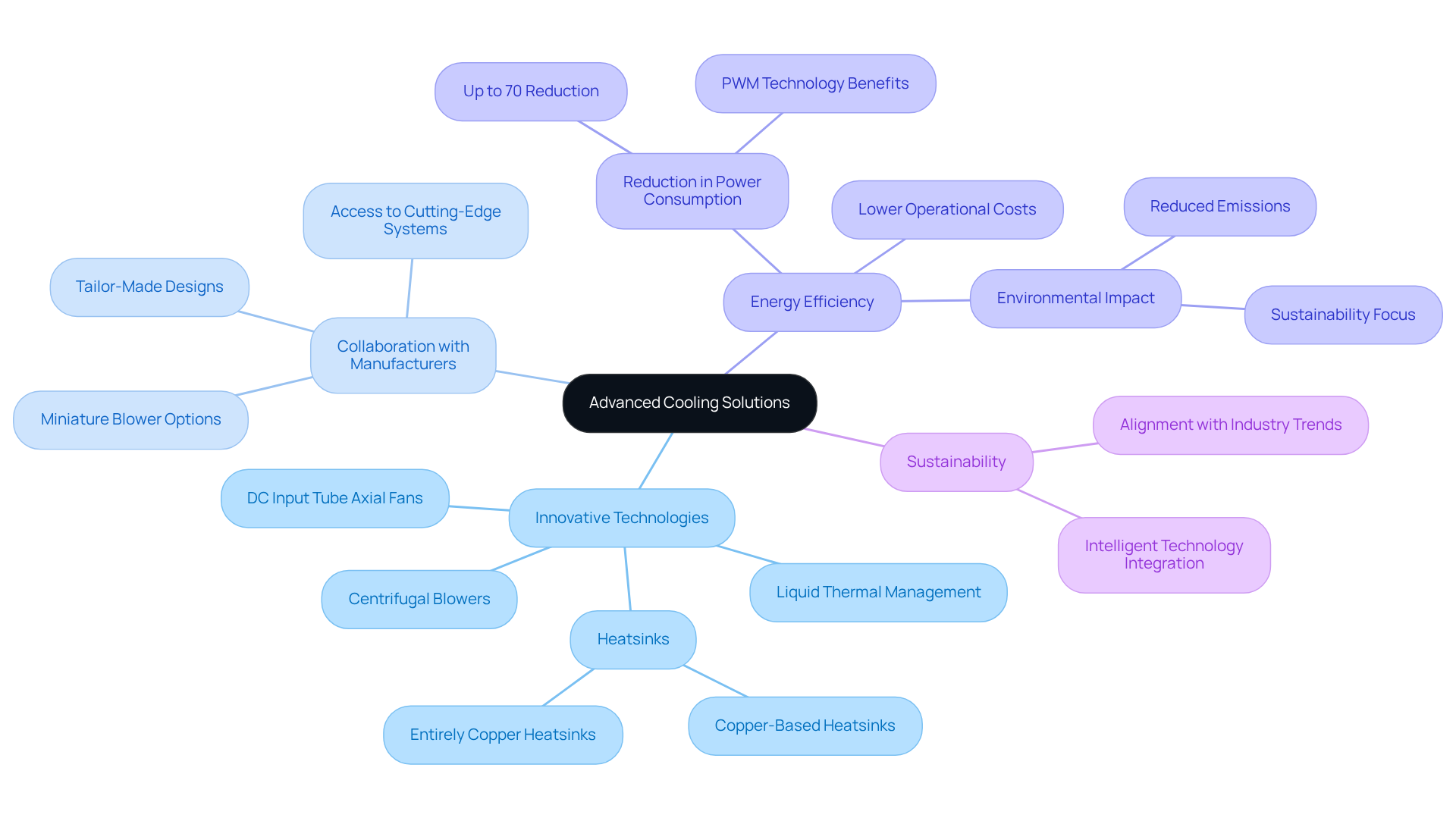
Schneider Electric: Energy-Efficient Cooling Systems
Schneider Electric presents a comprehensive suite of energy-efficient climate control systems meticulously engineered to enhance the performance of information facilities while simultaneously reducing energy consumption. Their cutting-edge temperature control technologies leverage AI and IoT for real-time monitoring and management, thereby ensuring optimal operational efficiency. Notably, the implementation of these systems can lead to a significant reduction in energy usage, as refrigeration systems typically account for approximately 55% of the overall energy consumption in information facilities.
This statistic underscores the critical importance of effective refrigeration methods, especially in relation to , given the escalating demand for energy-saving technologies in the server room climate management market, projected to reach USD 42.48 billion by 2032. By integrating Schneider Electric’s solutions, engineers can foster a more sustainable operation, achieving a reduction in their carbon footprint by up to 52% compared to industry averages—an essential consideration in today’s energy-aware climate.
Furthermore, the adoption of AI-driven strategies facilitates adaptable temperature management, a necessity as information hubs increasingly accommodate high-density IT environments, such as those with server racks demanding up to 132 kilowatts, supported by innovative data center cooling options developed in collaboration with Nvidia. This pioneering approach not only enhances temperature regulation efficiency but also contributes to substantial operational cost savings, establishing it as a vital element in contemporary facility design.
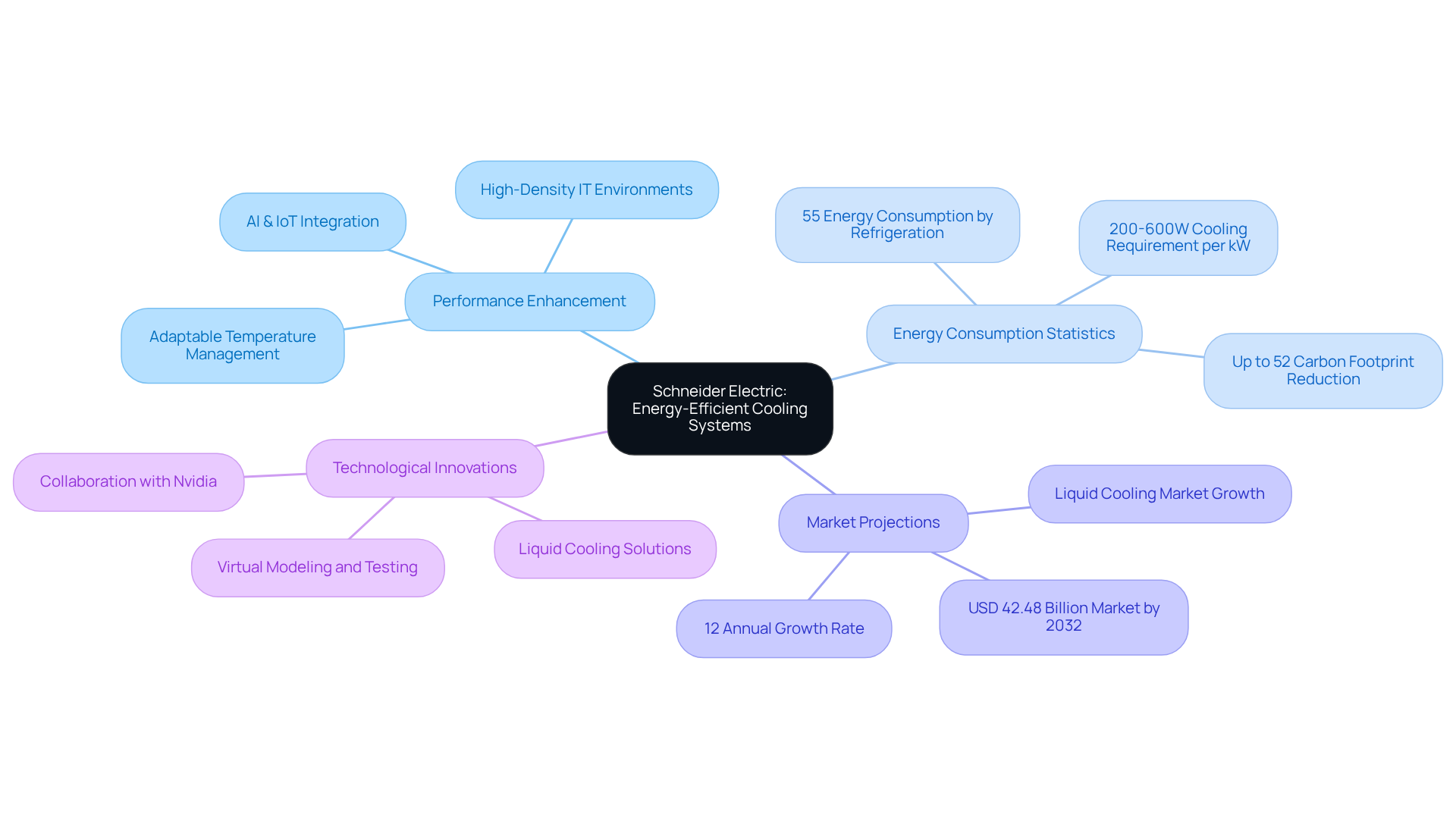
Vertiv Group Corp.: Comprehensive Cooling Solutions for Data Centers
Vertiv Group Corp. offers a comprehensive range of data center cooling options as part of its thermal management solutions, tailored to meet the evolving demands of information facilities. Their portfolio includes:
- Precision temperature control systems
- Liquid temperature management technologies
- Innovative hybrid solutions that integrate both air and liquid methods
These products are meticulously engineered to address the increasing thermal requirements associated with high-density computing, making data center cooling options essential in modern computing environments.
Recent data reveals that precision temperature control systems can significantly enhance energy efficiency, with certain designs achieving up to 70% improved annual energy efficiency by utilizing elevated water temperatures. This enhancement is particularly vital in high-density computing settings, where effective thermal management is critical for operational reliability. As data centers continue to expand, the adoption of data center cooling options is projected to grow at a compound annual growth rate (CAGR) of 12.4% from 2025 to 2032, reflecting the surging demand for efficient temperature management solutions.
Moreover, AI-driven temperature management optimization is emerging as a pivotal trend, with the capability to reduce energy consumption by as much as 40%. The integration of AI not only boosts operational efficiency but also addresses the escalating temperature demands driven by next-generation servers and cloud services. Vertiv’s commitment to pioneering positions them as a leader in enhancing the reliability and efficiency of information hubs in an increasingly data-centric world.
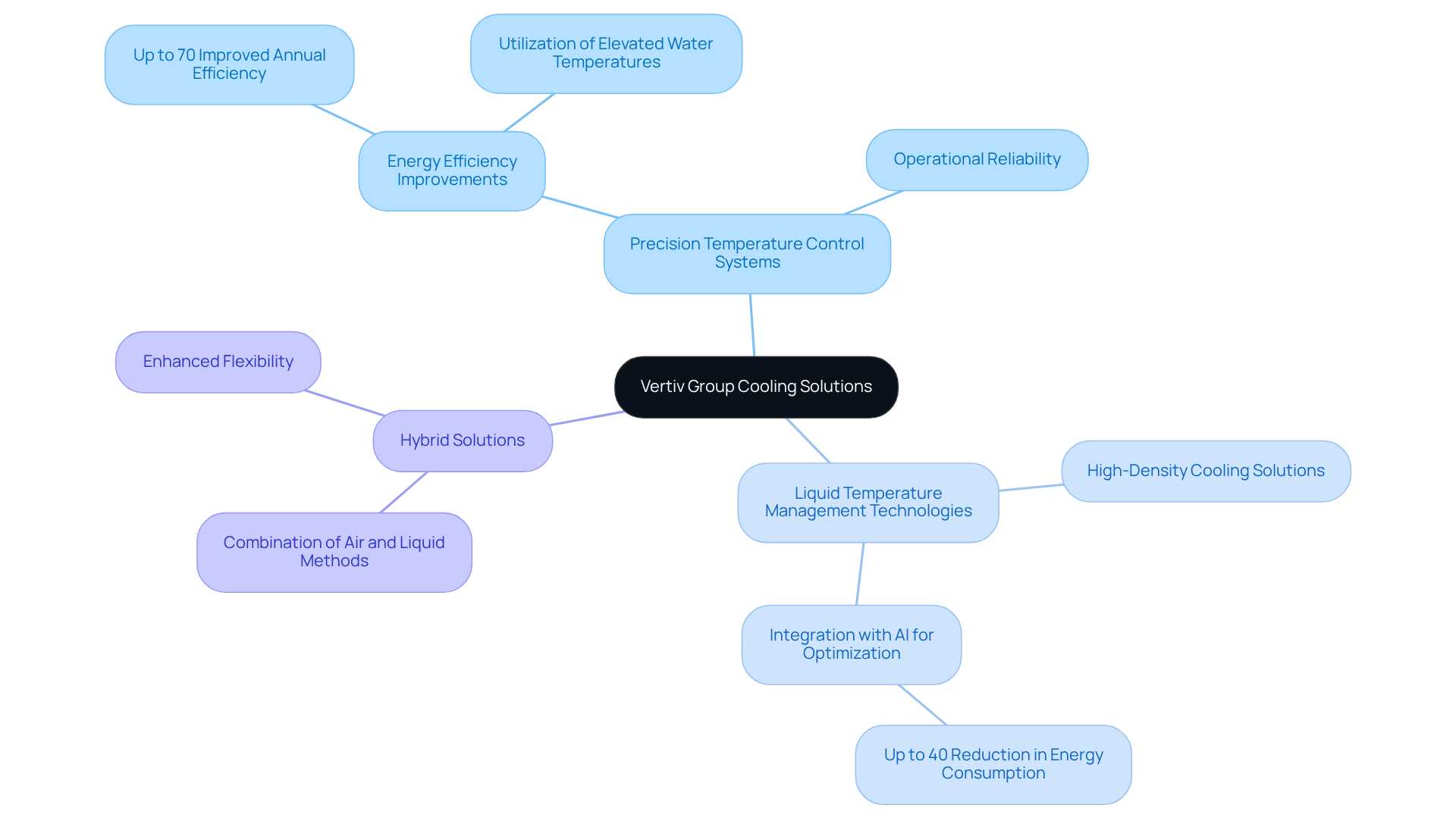
LiquidStack: Innovative Liquid Cooling Technologies
Gagner-Toomey Associates stands at the forefront of innovative temperature control technologies, delivering advanced data center cooling options such as DC input tube axial fans and centrifugal blowers that excel in thermal management for data centers. These are meticulously engineered to efficiently dissipate heat from high-density servers, effectively addressing the challenges posed by increasing power densities, which are projected to reach up to 250 kW per rack by 2030.
Direct-to-chip temperature management circulates coolant directly to heat-generating components, achieving energy savings that can surpass traditional air temperature regulation methods by 30% to 40%. Furthermore, immersion refrigeration, which submerges servers in dielectric fluids, eliminates the need for fans and achieves thermal performance that is 3,000 times more efficient than air methods, making it particularly effective for AI workloads.
Real-world applications, including Meta’s reported 40% reduction in energy expenses, have demonstrated substantial efficiency enhancements. Additionally, the worldwide facility liquid refrigeration market is anticipated to expand from USD 3.93 billion in 2024 to USD 22.57 billion by 2034, underscoring the necessity for engineers to embrace these advanced technologies.
By leveraging Gagner-Toomey Associates’ approaches, engineers can significantly improve data center cooling options, enhance temperature regulation, and facilitate substantial energy savings, thereby preparing their facilities for future requirements.
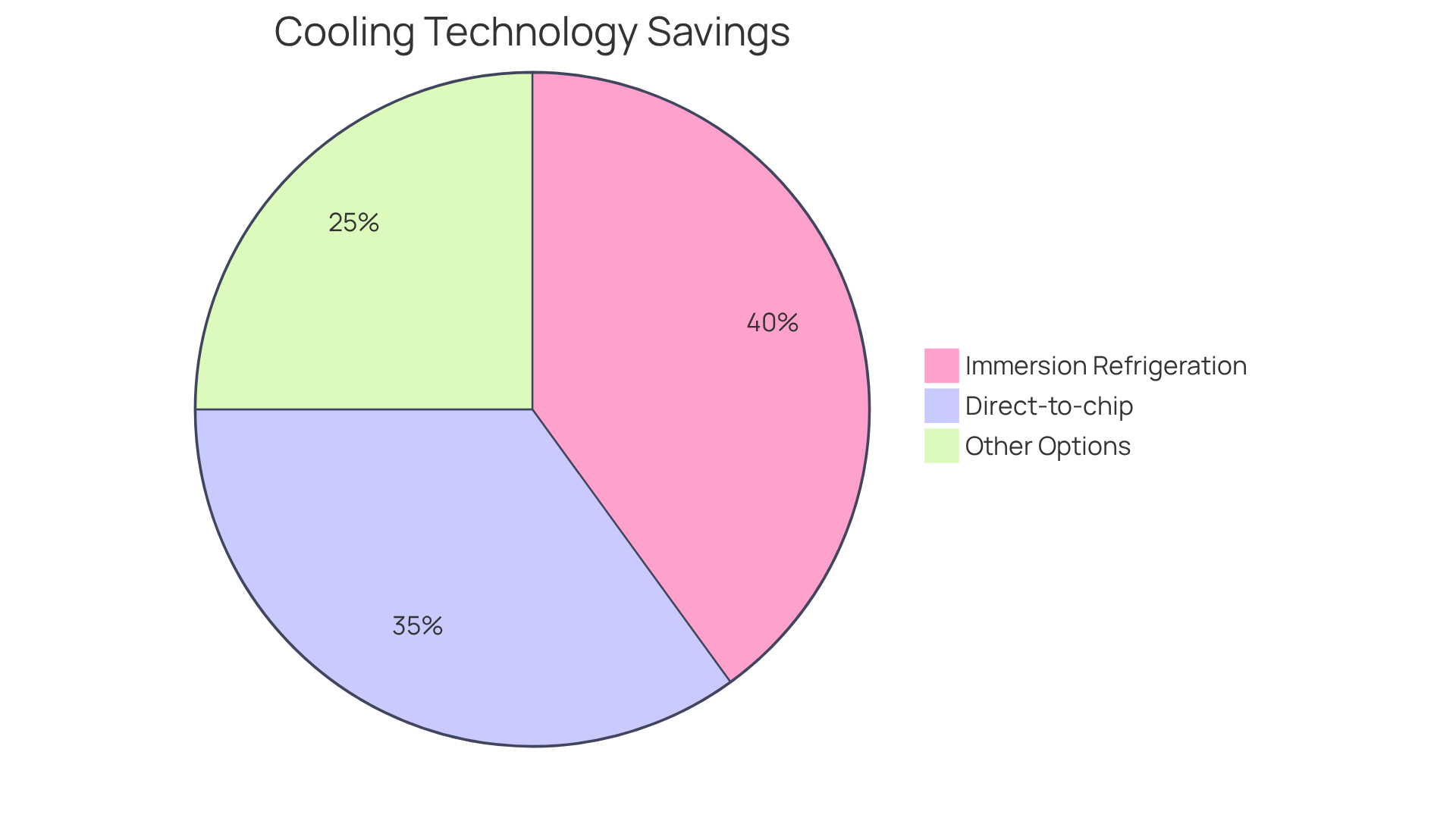
Green Revolution Cooling: Sustainable Cooling Solutions
Green Revolution Cooling stands at the forefront of sustainable temperature management solutions, harnessing immersion technology to dramatically enhance energy efficiency and minimize water consumption in data centers. This innovative approach not only optimizes temperature regulation but also addresses critical environmental challenges associated with traditional temperature management methods. For example, immersion systems can reduce water usage by as much as 50% compared to conventional air-based techniques, as demonstrated by numerous industry studies. This positions them as a within data facility operations.
Real-world implementations of immersion refrigeration technology showcase its efficacy. Facilities utilizing these systems have reported substantial reductions in overall water consumption, underscoring a commitment to environmentally responsible practices. As Sam Dore, Product Manager for Liquid Temperature Control in Europe, articulates, “Liquid temperature control can bring a potential improvement in power usage effectiveness of up to 45% compared to air systems,” emphasizing the transformative potential of these technologies. The shift towards immersion refrigeration is not merely a passing trend; it represents a significant evolution in data center cooling options and the way data centers manage heat and resource consumption. By adopting these advanced temperature regulation strategies, engineers can take concrete steps toward fostering a more sustainable future, such as integrating immersion temperature control systems into their designs and championing innovative temperature management technologies in their projects.
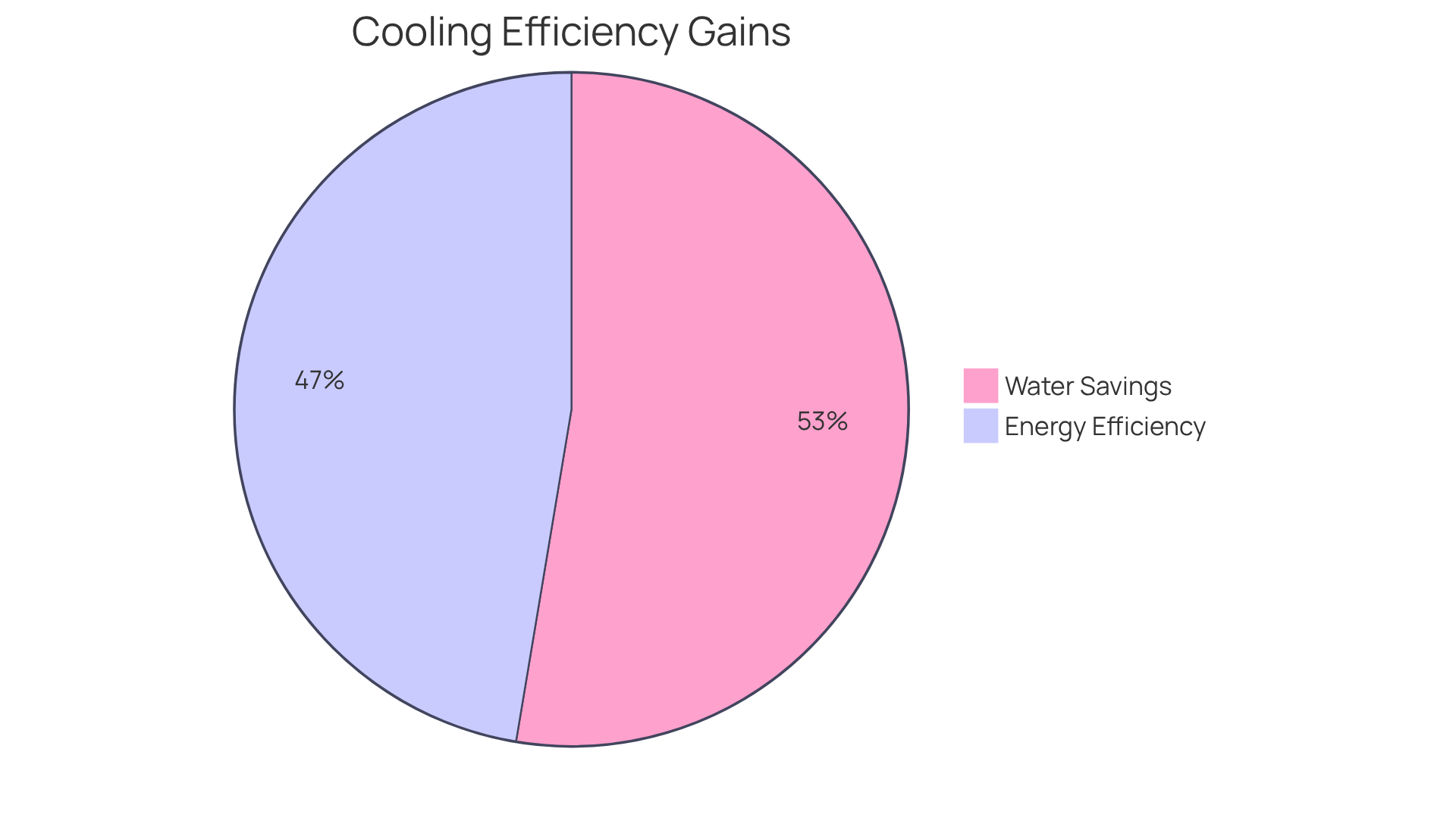
Asetek: Immersion Cooling Systems for High-Density Environments
Gagner-Toomey Associates stands at the forefront of advanced pump technologies, delivering solenoid and rotary boost pumps that are essential for precision applications in the electronics industry. These pumps, capable of operating up to 16 Bar, are specifically designed to enhance thermal management in high-density data center cooling options. By employing a DC brushless motor, an EMI suppression circuit, and PWM for control precision, Gagner-Toomey’s pumps guarantee precise control and low noise operation, making them ideal for environments where efficiency is paramount.
The integration of these advanced pumping solutions with immersion temperature regulation technology facilitates optimal thermal management, which is essential for effective data center cooling options and significantly reduces energy consumption. This method proves especially beneficial in settings where power densities are increasing, as it enables through data center cooling options without the challenges associated with conventional air-cooled systems. Notably, immersion thermal management can cut energy consumption by as much as 50% and achieve a Power Usage Effectiveness (PUE) under 1.0, establishing it as an eco-friendly option for facilities aiming to enhance operational efficiency.
Effective applications of Gagner-Toomey’s pump technologies, in conjunction with immersion systems, have demonstrated their ability to support greater megawatt capacities within the same footprint. This capability allows facilities to optimize their existing infrastructure while addressing the challenges posed by rising heat production. As the demand for processing capability continues to escalate, Gagner-Toomey Associates’ innovative strategy positions it as a critical player in the advancement of information hub temperature regulation. For further insights, visit our product website or locate a distributor.
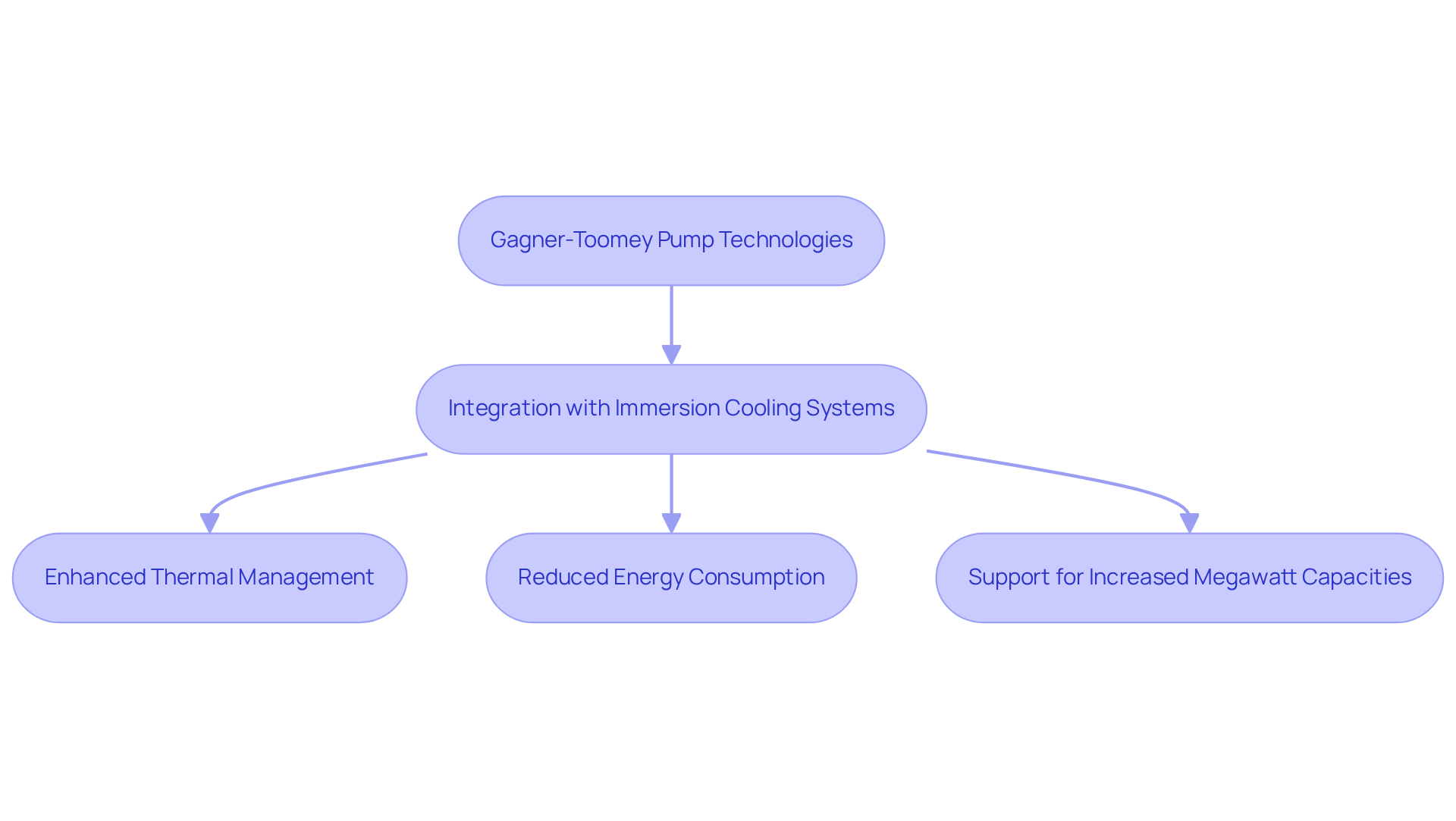
Iceotope: Advanced Liquid Cooling Solutions
Iceotope provides advanced liquid temperature regulation solutions that significantly enhance thermal control, serving as effective data center cooling options for information storage facilities. Their precision liquid temperature regulation technology effectively targets heat at its source, ensuring optimal heat removal and substantial improvements in energy efficiency, which are important considerations among various data center cooling options.
This innovative approach not only elevates the performance of information hubs but also provides to meet the increasing demands of high-density computing environments. Remarkably, among the data center cooling options, liquid temperature regulation systems can achieve effectiveness levels up to 3,000 times greater than traditional air temperature management methods, resulting in reduced energy consumption and prolonged equipment lifespan.
Furthermore, these data center cooling options decrease power usage effectiveness (PUE) and facilitate efficient heat repurposing for building heating systems, thereby contributing to overall sustainability. As industry expert Avi Mathur articulates, ‘Liquid temperature regulation enhances data center cooling options, thereby reducing energy use and improving sustainability.’
Moreover, maintaining cleanliness during the installation and servicing of liquid temperature regulation systems is essential to prevent contamination and ensure optimal performance. The integration of Coolant Distribution Units (CDUs) further enhances thermal efficiency by supplying regulated fluid to high-density IT equipment.
As information hubs evolve, the adoption of innovative data center cooling options becomes critical for preserving operational efficiency and sustainability.
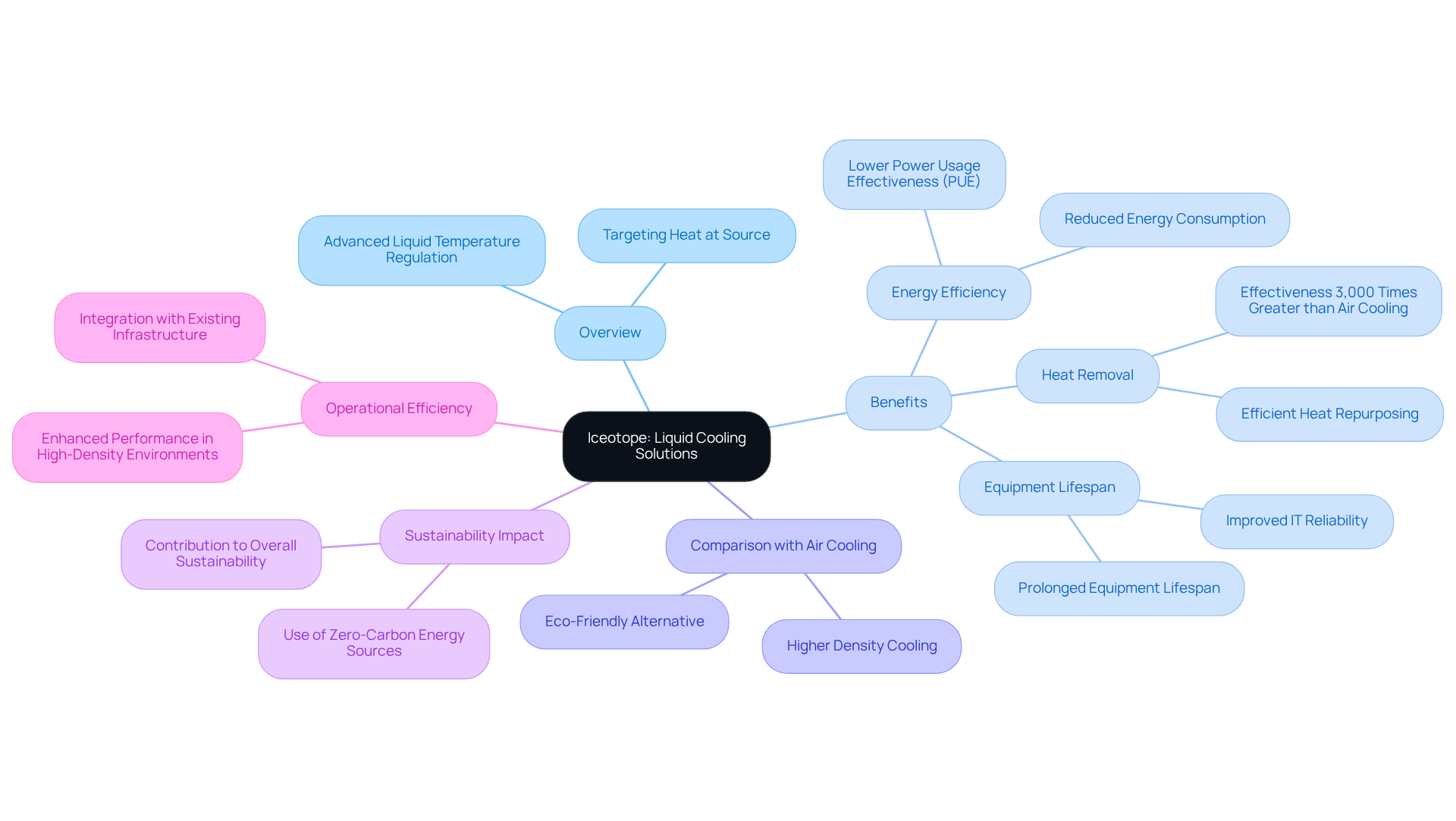
Delta Electronics, Inc.: Performance-Enhancing Cooling Technologies
Delta Electronics, Inc. presents a suite of advanced temperature regulation technologies meticulously designed for high-density information facilities, showcasing various data center cooling options. Their state-of-the-art air and liquid temperature regulation systems not only bolster but also substantially reduce operational costs. Notably, refrigeration can account for up to 40% of a facility’s total energy consumption, making the evaluation of data center cooling options vital for optimizing temperature control methods and overall performance. Delta’s Air Assisted Liquid Cooling (AALC) system, with capacities ranging from 40 to 144 kW, exemplifies this strategy by adeptly addressing the thermal requirements of high-end GPU servers while enhancing energy efficiency in AI-driven environments.
In 2022, information hubs consumed an estimated 200 TWh of electricity, underscoring the importance of embracing energy-efficient technologies. Delta’s innovations, including the 1.5 MW Coolant Distribution Unit (CDU) and the 33 kW Power Shelves, achieve impressive efficiency ratings of 98% and 97.5%, respectively, reflecting their dedication to sustainability and high performance.
The successful deployment of these refrigeration systems is evident in numerous information hubs, where Delta’s data center cooling options have been pivotal in mitigating the thermal challenges posed by high-density workloads. The integration of real-time monitoring and sophisticated airflow management ensures uniform temperature distribution, thereby minimizing the risks of overheating and hardware failure. As information hubs evolve to support increasingly demanding AI tasks, Delta’s performance-enhancing temperature management technologies remain at the forefront, enabling engineers to maintain optimal operational efficiency while curtailing energy consumption.
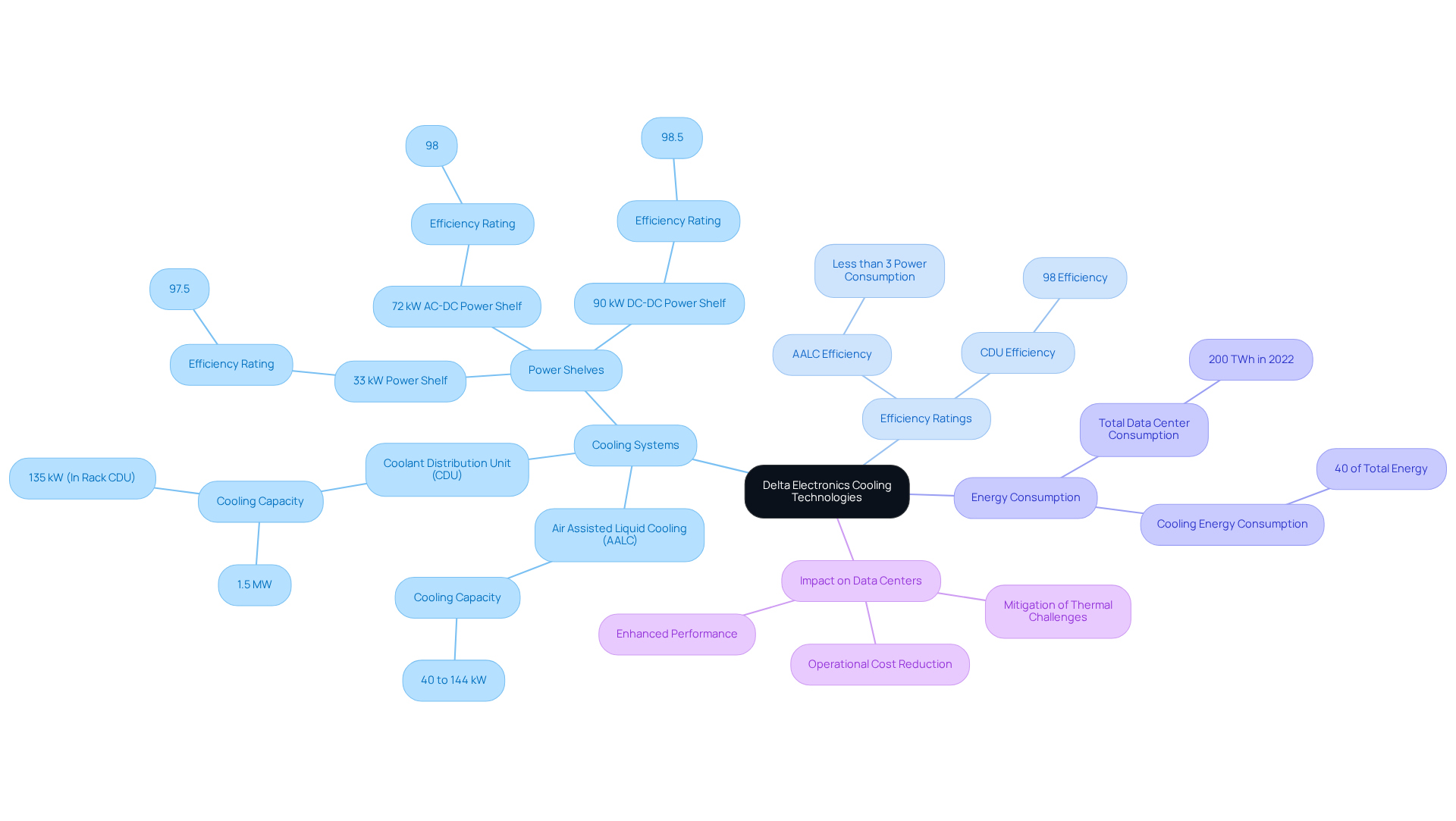
Emerson Electric: Precision Cooling Systems for Optimal Performance
Emerson Electric stands at the forefront of precision temperature control systems that are specifically designed to address the distinct thermal management needs of data center cooling options. Their innovative solutions encompass advanced monitoring and control systems that not only enhance performance but also significantly reduce energy consumption.
For instance, Emerson’s technologies facilitate real-time tracking of temperature and humidity levels, enabling dynamic adjustments that bolster operational reliability. This proactive approach not only improves the but also mitigates the risk of system failures, which can lead to costly downtime.
As information hubs evolve, the integration of such intelligent systems becomes essential for maintaining optimal performance and addressing the escalating demands of high-density computing environments. Industry insights reveal that refrigeration systems can account for as much as 40% of the total energy consumption in information facilities, emphasizing the critical importance of effective data center cooling options.
Experts emphasize that partnering with specialized facilities for temperature management yields numerous advantages, including a profound understanding of unique environmental requirements.
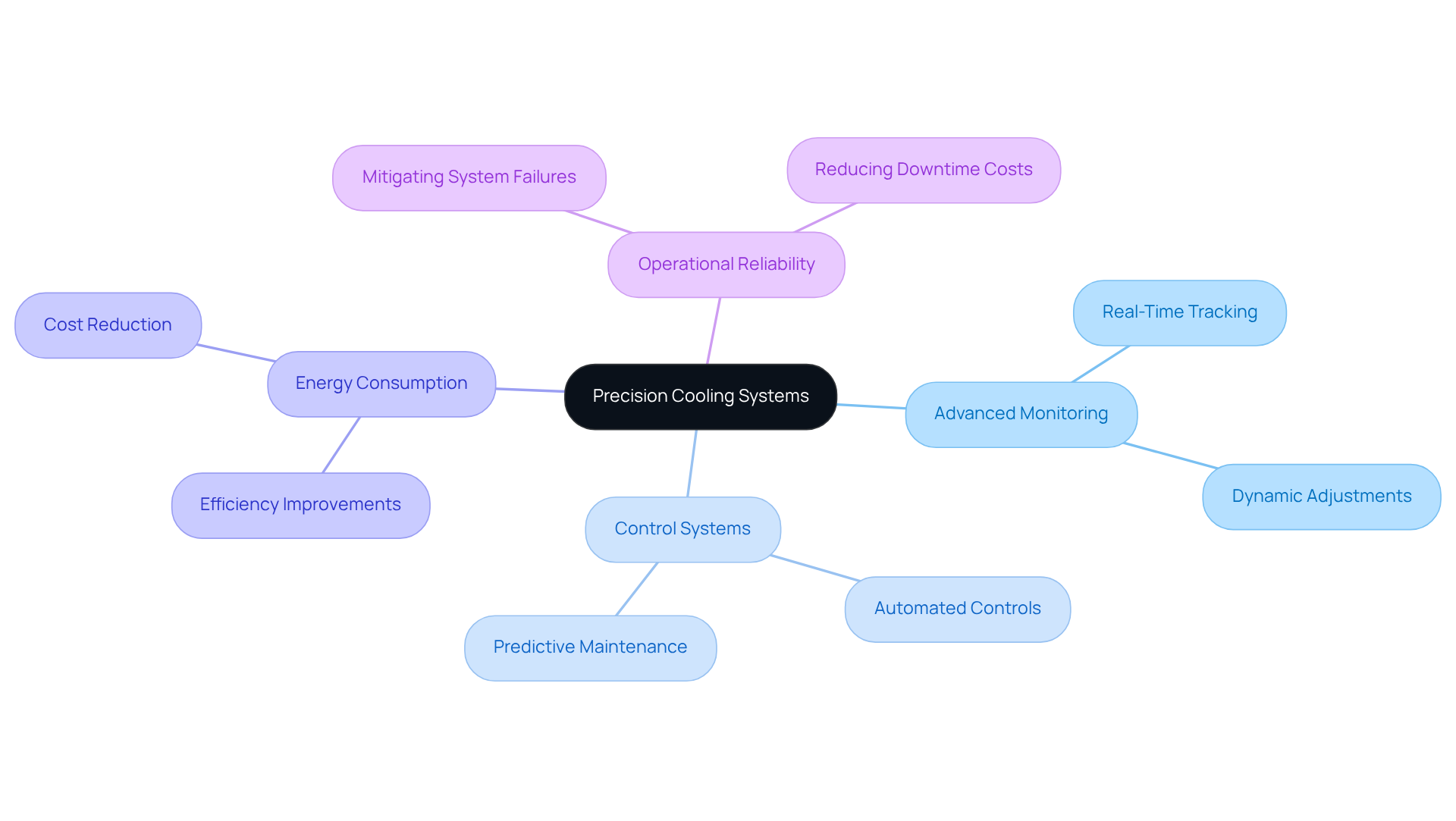
Nortek Air Solutions: Innovative Air Management for Data Centers
Nortek Air Solutions stands at the forefront of air management technologies, significantly enhancing temperature control efficiency with innovative data center cooling options. Their advanced HVAC systems are meticulously engineered to optimize airflow and temperature regulation, which is essential for maintaining operational reliability in data center cooling options.
By leveraging Nortek’s innovative solutions, engineers can achieve substantial improvements in temperature control system performance. For instance, effective airflow management can reduce energy consumption by as much as 40% through AI-driven temperature regulation, underscoring the transformative potential of these technologies.
As information hubs increasingly adopt advanced HVAC systems, the focus on precise temperature regulation will intensify, particularly with the anticipated rise in power densities, projected to escalate from 8 kW to 17 kW per rack by 2027. This trend is driven by the growing demand for AI-powered applications, necessitating to maintain optimal conditions.
Successful implementations of these sophisticated systems have already proven their capability to ensure that critical IT infrastructure operates seamlessly and efficiently.
Looking ahead to 2025, the integration of cutting-edge HVAC solutions will be imperative for data centers, particularly in exploring various data center cooling options to address the challenges posed by rising cooling requirements and energy efficiency demands.
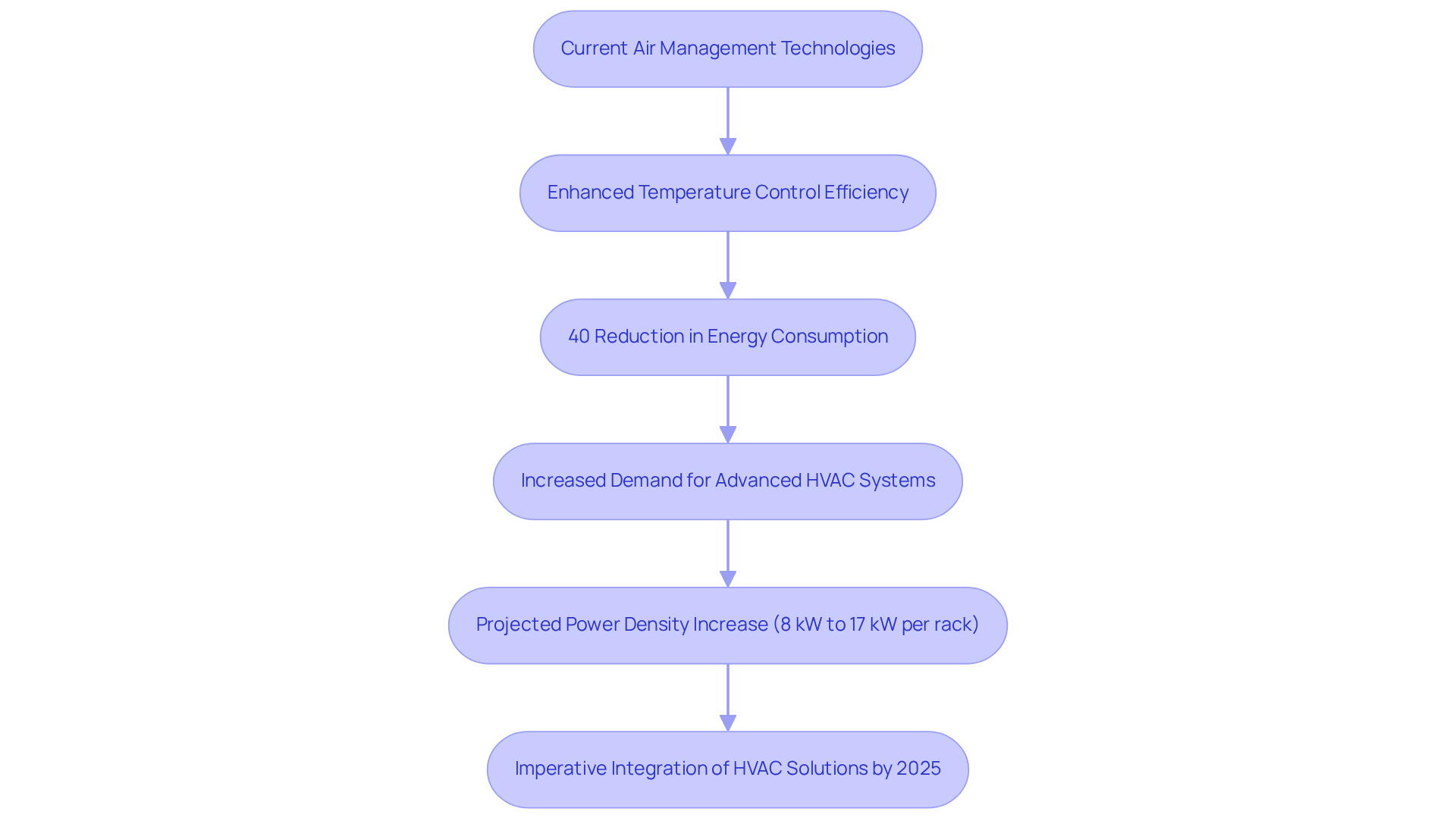
Conclusion
The exploration of essential data center cooling options underscores the critical role these technologies play in ensuring operational efficiency and sustainability within modern information facilities. As the demand for high-density computing escalates, effective temperature regulation systems have become indispensable for engineers striving to maintain optimal performance while minimizing energy consumption.
Key insights from the article illuminate the diverse range of cooling solutions available, from:
- Gagner-Toomey Associates’ advanced thermal management technologies
- Schneider Electric’s AI-driven systems that significantly reduce energy usage
The emphasis on innovative liquid cooling methods, such as those from:
- LiquidStack
- Iceotope
signifies a shift towards more sustainable practices that not only enhance energy efficiency but also address pressing environmental concerns. Furthermore, companies like:
- Delta Electronics
- Emerson Electric
are at the forefront with precision cooling systems that adeptly respond to the ever-increasing thermal demands of data centers.
In light of these advancements, it is evident that adopting cutting-edge cooling technologies transcends operational necessity; it embodies a commitment to sustainability. Engineers and facility managers are urged to explore these innovative solutions and integrate them into their designs to optimize energy efficiency and reduce operational costs. Embracing these data center cooling options will not only bolster the reliability of critical IT infrastructure but also contribute to a more sustainable future in the data center industry.
Frequently Asked Questions
What types of cooling solutions does Gagner-Toomey Associates provide for data centers?
Gagner-Toomey Associates offers advanced temperature regulation systems, including DC input tube axial fans, centrifugal blowers, and a variety of heatsinks, both copper-based and entirely copper options, along with liquid thermal management methods.
How do Gagner-Toomey cooling solutions improve energy efficiency?
Gagner-Toomey cooling solutions feature energy-efficient fans that can reduce power consumption by up to 70% compared to traditional methods, significantly lowering operational costs and emissions.
What role does intelligent technology play in Gagner-Toomey’s cooling systems?
Intelligent technology within Gagner-Toomey’s systems enhances monitoring and management of energy consumption, supporting sustainability efforts in data center operations.
What energy-efficient cooling systems does Schneider Electric offer?
Schneider Electric provides a suite of energy-efficient climate control systems that utilize AI and IoT for real-time monitoring and management, aimed at reducing energy consumption in information facilities.
How much energy consumption can be reduced by implementing Schneider Electric’s systems?
The implementation of Schneider Electric’s systems can lead to a reduction in energy usage by up to 52% compared to industry averages, particularly important as refrigeration systems account for about 55% of overall energy consumption in information facilities.
What innovative approaches are being integrated into Schneider Electric’s cooling solutions?
Schneider Electric’s solutions include AI-driven strategies for adaptable temperature management, which are essential for high-density IT environments.
What cooling options does Vertiv Group Corp. provide?
Vertiv Group Corp. offers precision temperature control systems, liquid temperature management technologies, and hybrid solutions that combine air and liquid cooling methods.
How does precision temperature control impact energy efficiency in data centers?
Precision temperature control systems can achieve up to 70% improved annual energy efficiency by utilizing elevated water temperatures, which is crucial in high-density computing environments.
What is the projected growth rate for data center cooling options?
The adoption of data center cooling options is projected to grow at a compound annual growth rate (CAGR) of 12.4% from 2025 to 2032.
How does AI contribute to cooling solutions provided by Vertiv?
AI-driven temperature management optimization can reduce energy consumption by as much as 40%, enhancing operational efficiency and addressing the thermal demands of next-generation servers.

